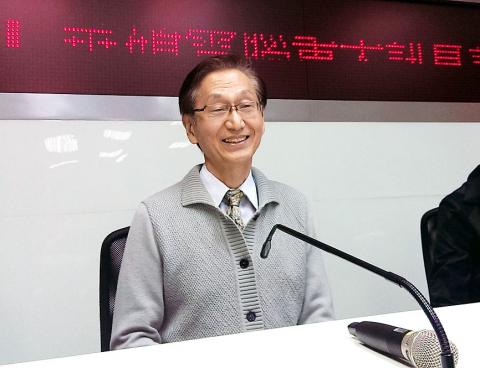Chip designer VIA Technologies Inc (威盛) said it is seeking NT$4.14 billion (US$139 million) in damages in a lawsuit against PC vendor Asustek Computer Inc (華碩電腦), its subsidiary ASMedia Technology Inc (祥碩科技) and company executives for misappropriating trade secrets.
VIA’s move came after prosecutors on Nov. 8 decided to pursue criminal proceedings against ASMedia and four employees, including research and development division vice president Chang Chi (張棋), after concluding a more than year-long investigation into the alleged misappropriation of VIA’s trade secrets and contravention of the Copyright Act (著作權法).
ASMedia chairman Jerry Shen (沈振來), president Lin Che-wei (林哲偉) and other employees stole VIA’s intellectual property related to USB technology, the chipmaker said in a statement on Tuesday night.

Photo: CNA
“In addition to protecting the interests of VIA and our shareholders, the aim of this suit is to ensure that our industry operates in a healthy market environment that fosters innovation and promotes fair competition,” VIA chief executive officer Chen Wen-chi (陳文琦) said.
ASMedia, a 49-percent holding of Asustek, designs controller chips used in data storage.
In addition to seeking damages, VIA asked the court to stop ASMedia from making and selling chips that infringed on its intellectual property rights.
VIA shares jumped 1.49 percent to NT$27.30 yesterday, while those of ASMedia and Asustek plunged 2.56 percent and 2.34 percent to NT$32.35 and NT$271 respectively.
Lin, a former VIA executive, left the company in 2007 for ASMedia, along with dozens of VIA employees. VIA accused Lin of stealing the firm’s intellectual property related to USB technology, including host and device controllers, that are used in computing and consumer electronics products, including PCs, external hard disk drives and peripheral devices.
The government amended the Trade Secret Act (營業秘密法) earlier this year to enhance the nation’s intellectual property protection laws. One key reform included increasing the penalties for intellectual property crimes, so that any person who misappropriates trade secrets in Taiwan with the intent to use them overseas may be imprisoned for up to 10 years and fined up to US$1.7 million, or possibly more if there are substantial illicit gains.
Asustek yesterday said that VIA’s accusations were groundless.
“As a victim of the VIA-ASMedia lawsuit, Asustek will take legal action to safeguard its rights,” the company said.
Asustek chief financial officer David Chang (張偉明) told a press conference that the company has suffered from media reports about VIA’s lawsuit.
Chang said VIA’s move had “caused huge trouble” for the company and raised concern among Asustek’s partners, clients, investors and employees.
“We will fight to the end,” Asustek chairman Johnny Shih (施崇棠) said, adding that VIA’s action was “suspicious” and meant to “disrupt Asustek’s operations.”
Shen, who is also Asustek’s CEO, joined the press briefing through a video teleconference.
“It’s totally unreasonable,” Shen said of VIA’s lawsuit against him and Asustek.
Shen urged VIA to take “standard” legal actions rather than leaking information to the media and causing Asustek unnecessary trouble.

With an approval rating of just two percent, Peruvian President Dina Boluarte might be the world’s most unpopular leader, according to pollsters. Protests greeted her rise to power 29 months ago, and have marked her entire term — joined by assorted scandals, investigations, controversies and a surge in gang violence. The 63-year-old is the target of a dozen probes, including for her alleged failure to declare gifts of luxury jewels and watches, a scandal inevitably dubbed “Rolexgate.” She is also under the microscope for a two-week undeclared absence for nose surgery — which she insists was medical, not cosmetic — and is

CAUTIOUS RECOVERY: While the manufacturing sector returned to growth amid the US-China trade truce, firms remain wary as uncertainty clouds the outlook, the CIER said The local manufacturing sector returned to expansion last month, as the official purchasing managers’ index (PMI) rose 2.1 points to 51.0, driven by a temporary easing in US-China trade tensions, the Chung-Hua Institution for Economic Research (CIER, 中華經濟研究院) said yesterday. The PMI gauges the health of the manufacturing industry, with readings above 50 indicating expansion and those below 50 signaling contraction. “Firms are not as pessimistic as they were in April, but they remain far from optimistic,” CIER president Lien Hsien-ming (連賢明) said at a news conference. The full impact of US tariff decisions is unlikely to become clear until later this month

GROWING CONCERN: Some senior Trump administration officials opposed the UAE expansion over fears that another TSMC project could jeopardize its US investment Taiwan Semiconductor Manufacturing Co (TSMC, 台積電) is evaluating building an advanced production facility in the United Arab Emirates (UAE) and has discussed the possibility with officials in US President Donald Trump’s administration, people familiar with the matter said, in a potentially major bet on the Middle East that would only come to fruition with Washington’s approval. The company has had multiple meetings in the past few months with US Special Envoy to the Middle East Steve Witkoff and officials from MGX, an influential investment vehicle overseen by the UAE president’s brother, the people said. The conversations are a continuation of talks that

CHIP DUTIES: TSMC said it voiced its concerns to Washington about tariffs, telling the US commerce department that it wants ‘fair treatment’ to protect its competitiveness Taiwan Semiconductor Manufacturing Co (TSMC, 台積電) yesterday reiterated robust business prospects for this year as strong artificial intelligence (AI) chip demand from Nvidia Corp and other customers would absorb the impacts of US tariffs. “The impact of tariffs would be indirect, as the custom tax is the importers’ responsibility, not the exporters,” TSMC chairman and chief executive officer C.C. Wei (魏哲家) said at the chipmaker’s annual shareholders’ meeting in Hsinchu City. TSMC’s business could be affected if people become reluctant to buy electronics due to inflated prices, Wei said. In addition, the chipmaker has voiced its concern to the US Department of Commerce